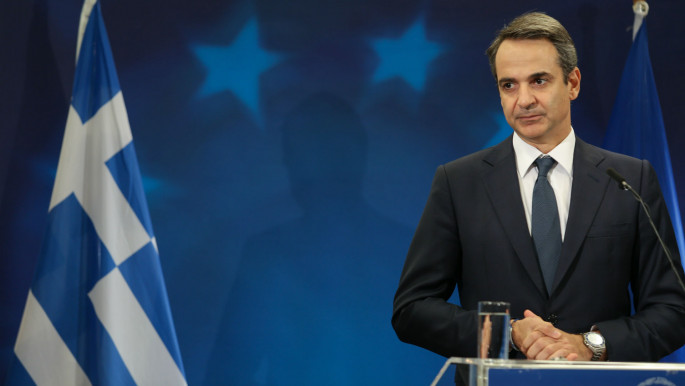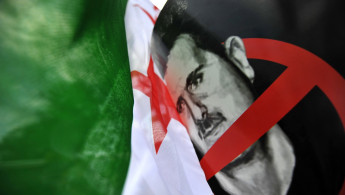Enemy of my enemy: Turkey's rivals are normalising Assad's regime with an eye on Ankara
In recent months, more countries are restoring diplomatic ties with the regime of President Bashar al-Assad in Syria.
While this is not an insignificant diplomatic boon for Assad's regime, which has been largely isolated since the start of the bloody conflict in Syria, it's also not necessarily an indication that his regime will be brought in from the cold by the so-called international community anytime soon, if ever.
Most of the countries that have restored ties with Damascus, or are seriously contemplating doing so, are motivated, at the very least partially, by their strong desire to undermine Turkey's objectives in both Syria and the wider region, as these three case studies demonstrate.
United Arab Emirates
The powerful Crown Prince of the United Arab Emirates (UAE) Mohammed bin Zayed Al Nahyan (often referred to by his initials MBZ) has spearheaded an active campaign in the Middle East and North Africa to hinder Turkey's goals in the region.
In this regional cold war, the UAE has helped prop up President Abdel Fattah el-Sisi in Egypt – a major rival of Turkey who has cracked down hard on the Muslim Brotherhood in the country following the July 2013 coup that he oversaw – and supported other groups opposed to Turkey in the region, such as the Libyan National Army (LNA).
 |
Assad's regime has been largely isolated since the start of the bloody conflict in Syria |  |
As part of these efforts, the UAE became one of the first major Arab countries to re-establish diplomatic ties with the Assad regime, reopening the Emirati embassy in Damascus in December 2018. This was a significant move considering the fact the UAE previously supported the various ragtag rebel groups trying to depose Assad.
Late last year, Abu Dhabi even went so far to praise Assad for his "wise leadership", underscoring how fundamentally ties have improved.
A large part of the highly significant UAE rapprochement with Assad is motivated by combating the influence of both Turkey and the Muslim Brotherhood groups it supports anywhere and everywhere it can.
 |
|
| Read more: France and Turkey's growing rivalry in the Middle East |
In the Syrian context, bringing Assad in from the cold aids the UAE's policy of making life difficult for Turkey in Syria, where Ankara and its Syrian militiamen proxies occupy various swathes of that country's north.
In October 2019, the UAE condemned Turkey's Operation Peace Spring against Syrian Kurdish-led paramilitary forces in northeast Syria.
In February and early March 2020, Turkey engaged Syrian regime forces in the most serious military escalation between the two to date.
In Turkey's Operation Peace Storm, Turkish forces and armed drones decimated Syrian ground forces, destroying several vehicles and killing scores of soldiers and pro-regime militiamen after losing over 60 of its own soldiers deployed in the north-western Syrian province.
Russia rushed to broker a ceasefire to end the fighting before it spiralled out of control. The UAE, on the other hand, had reportedly wanted to convince Damascus to keep on fighting against Turkey to draw it deeper into the Syrian quagmire.
MBZ even offered to pay the Assad regime a much needed $3 billion to keep the fighting going, potentially putting the UAE in a position of becoming a more significant financial patron of Assad than his most stalwart backer Iran.
 |
The UAE became one of the first major Arab countries to re-establish diplomatic ties with the Assad regime |  |
If true, such an offer aptly underscores the lengths Abu Dhabi is willing to go to hinder Turkey's objectives across the region.
Libyan National Army
Early in March 2020, as fighting between Turkey and the Syrian regime raged in Idlib, a delegation from General Khalifa Haftar's LNA group visited Damascus to reopen the Libyan embassy there.
"A memorandum of understanding was signed… for the reopening of diplomatic and consular missions," reported the Syrian state-run SANA news network.
Both sides oppose Turkey and its activities in the wider region and declared they would "confront Turkish interference and aggression against both countries."
While Haftar and his LNA believe themselves to be the legitimate government of Libya, the actual UN-recognised government of Libya is the group's adversary, the Government of National Accord (GNA) in the nation's capital Tripoli. Haftar, who controls most of Libya from the eastern city of Benghazi, started besieging Tripoli in April 2019, hoping to uproot the GNA and make himself the undisputed leader of Libya.
 |
|
| Read more: 'Our fear is doubled': Exhausted by war, Syrians struggle to cope with coronavirus pandemic |
Turkey, however, intervened on the side of the GNA, supplying it with armoured vehicles and armed drones. More recently, it even begun to send thousands of former Syrian rebels it had used as proxies in Syria to Libya to help bolster the GNA's defence of Tripoli. Ankara is showing no signs of wavering in its resolve to prevent Haftar from winning the civil conflict in Libya.
Haftar's main backer in the Libyan conflict is the UAE, making Libya an increasingly more important front in the region-wide Turkey-UAE cold war. The UAE also supplied Haftar's LNA with armed drones and diplomatically defend him and his group. Abu Dhabi's alleged deal with Assad to keep the fighting going in Idlib was most certainly motivated by its desire to distract Turkey's focus in the battle for Tripoli.
In a similar vein, the LNA's establishment of ties with Assad may well have been motivated by a desire to coordinate future battles against Turkey. For example, if fighting between Turkey and Syria in Idlib flares-up again, Assad may request the LNA to try and pressure Turkey and its proxies in Libya in an attempt to distract Ankara or force it to fight on two fronts simultaneously.
The same might also apply if the LNA finds itself on the defensive, which has increasingly been the case in western Libya in recent weeks.
 |
Haftar's main backer in the Libyan conflict is the UAE, making Libya an increasingly more important front in the region-wide Turkey-UAE cold war |  |
Nevertheless, establishing relations with Assad seems to have already yielded tangible benefits for the LNA. The United States recently said that Russia is helping Damascus transfer militiamen and equipment to Haftar's forces to help them continue fighting against the GNA and Turkey.
Greece
This month, Greece became the latest country to begin patching up its relations with the Assad regime, announcing the restoration of ties and appointing Tasia Athanassiou, a former ambassador to Russia and Syria, as Special Envoy of Greece's Foreign Ministry for Syria.
This could well constitute a major diplomatic boost for Assad. After all, Greece is both a member of the European Union and the North Atlantic Treaty Organization (NATO) alliance. It's also a long-time rival of Turkey.
 |
|
| Read more: Syria Weekly: Greece's centre-right government moves towards Assad normalisation |
It's unclear how much Greece's opposition to Turkey's foreign policy motivated the restoration of ties between Athens and Damascus. However, it wouldn't be at all surprising if this opposition was a very significant factor.
For decades, Greece and Turkey have been locked in a territorial dispute in the Aegean Sea. Fighter jets of the Hellenic and Turkish Air Forces, both NATO air forces incidentally, routinely engage in dangerous mock dogfights that have killed pilots on both sides over the years.
Aside from this, Greece has opposed numerous Turkish policies in the region. For one, it opposes Ankara's drilling for natural gas in the Republic of Cyprus' economic exclusion zone (EEZ).
Athens also strongly opposes the controversial maritime deal Ankara established with the GNA in Tripoli last December, the aim of which is to link Turkey's southern Mediterranean shore directly with Libya's distant northeast coast, creating a lucrative EEZ in that vast area.
That EEZ, among other things, completely ignores the existence of the Greek island of Crete.
In January, Greek Prime Minister Kyriakos Mitsotakis even threatened to block any European peace deal to end the Libyan conflict unless the maritime deal was cancelled.
 |
This month, Greece became the latest country to begin patching up its relations with the Assad regime, announcing the restoration of ties |  |
It's against this backdrop that Athens may have figured giving Assad a small diplomatic boost at Ankara's expense may have been in its interest. Only time will tell if that was the case.
If it is proven so it would not be without precedent. For example, in late March 1996 then-Greek Defence Minister Yerasimos Arsenis announced that Greece and Syria had made a military-cooperation agreement, clearly with Turkey as their main mutual rival. He also advocated the creation of a coalition against Turkey consisting of Greece, Syria, Iran, Iraq and Armenia among others.
That bombastic rhetoric demonstrated just how tense relations between Greece and Turkey can get. These days relations between Ankara and Athens are not at all cordial as their increasingly contentious disputes in the Aegean and East Mediterranean endure.
In this context, it would not at all be surprising if its staunch opposition to Turkey's activities in these areas motivated Athens to once again take the road to Damascus to undermine its long-time rival in Ankara.
Follow him on Twitter: @pauliddon



